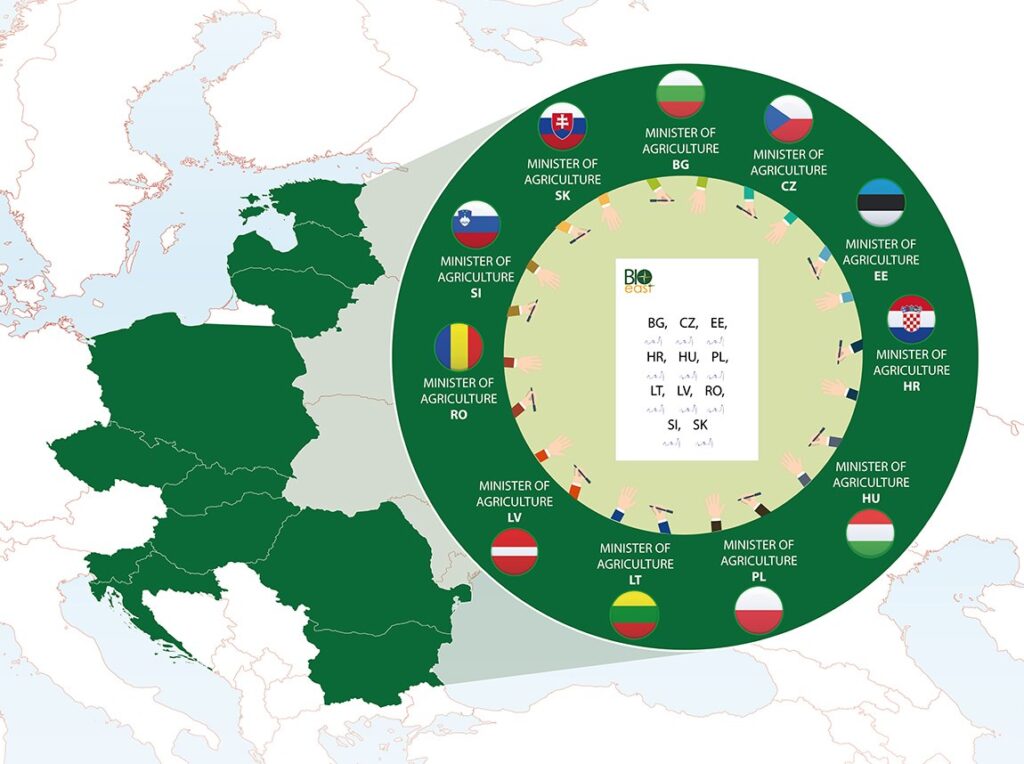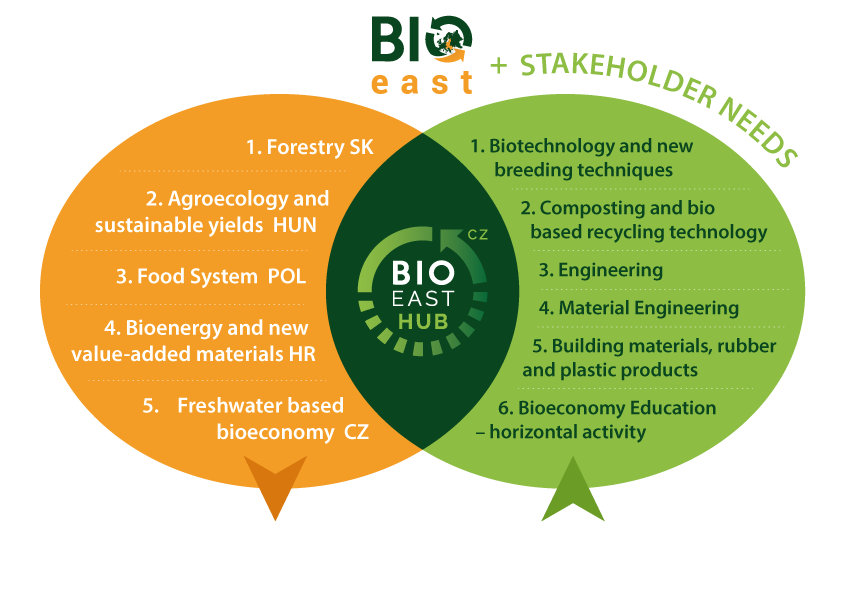In this interview we discuss with Barna Kovács, Counsellor at the Permanent Representation of Hungary to the EU and Secretary General of the BIOEAST Initiative. The BIOEAST initiative is a collaborative framework developed by Central and Eastern European countries to promote sustainable, knowledge-based growth in agriculture, aquaculture, and forestry within the bioeconomy. It emerged in response to disparities in research, innovation, and the need for greater cohesion across the European Union. By focusing on shared research, innovation, and transnational cooperation, BIOEAST aims to overcome regional challenges such as climate change, economic inequalities, and governance issues, fostering a sustainable and circular bioeconomy across the CEE region.
In this interview, Barna highlights the regions immense potential within Europe’s bioeconomy. He points out their agricultural landscapes, rich natural resources, and underutilised biomass, positioning them as valuable contributors to food, industrial, and energy security. Barna underscores the role of the BIOEAST initiative in harnessing this potential through a shared framework for research, innovation, and policy alignment, helping to create jobs, foster sustainability, and increase Europe’s competitiveness. He emphasises BIOEAST’s efforts in advancing a circular bioeconomy, tackling research infrastructure limitations, and supporting rural communities, aiming to bridge regional gaps and strengthen local bioeconomy ecosystems.
POLICY ANSWERS: Why are the countries in central, eastern and south-eastern Europe so important for Europe’s bioeconomy? What potentials do you see e.g. in terms of increasing Europe’s competitiveness, job creation and environmental sustainability?
Barna: The Central, Eastern, and South-Eastern European countries hold significant potential for the bioeconomy due to their vast agricultural landscapes, rich natural resources, and underutilized biomass potential including biological waste resources. These countries have strong primary sectors, such as agriculture, forestry, and fisheries, that are ideal for advancing bioeconomy initiatives. Considering the biomass potential, the region could significantly contribute to the European, food, industrial and energy security. By integrating innovative bio-based solutions, the region can contribute significantly to Europe’s competitiveness, creating new opportunities for job creation, especially in rural areas, where such initiatives can offer sustainable livelihoods.
Furthermore, these regions are pivotal in advancing environmental sustainability through circular bioeconomy models that reduce dependency on fossil fuels and promote resource efficiency. With the right infrastructure and innovation, they can transform local resources into high-value products, fostering both economic growth and environmental resilience.

POLICY ANSWERS: Could you describe what and who “BIOEAST” is in a nutshell? What has this initiative which you coordinate achieved already and where would you like to go?
Barna: BIOEAST is an intergovernmental initiative formed by 11 Central and Eastern European countries to advance the bioeconomy in the region, to support better performance in the European Research and Innovation Framework programme. It aims to enhance the region’s bioeconomy through cooperation in research and innovation, policy alignment, and the promotion of sustainable practices across bio-based sectors like agriculture, forestry, and fisheries.
Since its inception, BIOEAST has successfully brought together national governments, academia, and other stakeholders to align national strategic research and innovation agendas, to conclude science-policy discussions and to steer the future proof strategy development with the EU’s bioeconomy framework. It has fostered collaboration, secured key priorities among the topics for research and innovation, and increased awareness of bioeconomy potentials in the region. Moving forward, BIOEAST seeks to expand its role by stakeholder engagement including industry players, driving policy change, strengthening bio-based value chains, and ensuring that the region becomes a key player in Europe’s bioeconomy deployment.
POLICY ANSWERS: How does BIOEAST support the transition towards a circular bioeconomy? Could you share some examples of innovative bio-based value chains being developed in the region?
Barna: BIOEAST supports the transition to a circular bioeconomy by promoting sustainable resource management and innovative practices that close material loops and minimize waste. The initiative fosters collaboration among countries to develop macro-regional strategy that optimize the use of local biomass while promoting bio-based products and sustainable processes.
Examples of innovative bio-based value chains in the region include the development of biorefineries that transform agricultural residues into bioenergy or bioplastics, and projects that use forest or agricultural by-products to create high-value materials for the chemical industry. Other initiatives focus on food waste valorization, turning organic waste into fertilizers or energy, thus contributing to both sustainability and economic growth.
POLICY ANSWERS: The initiative highlights a “research and innovation deadlock” in the region. What are the major steps BIOEAST is taking to improve research infrastructure and encourage collaboration between researchers and practitioners?
Barna: BIOEAST acknowledges the “research and innovation deadlock” in Central and Eastern Europe, where challenges such as limited funding, outdated research infrastructure, and fragmented collaboration hinder the region’s bioeconomy development. To address these issues, BIOEAST is committed to several key steps:
- Mobilizing EU funding: Encouraging member countries to make better use of Horizon Europe and other EU funding opportunities to boost bioeconomy-related research and innovation in the region.
- Capacity building and knowledge exchange: Through workshops, training sessions, and science- policy dialogues, BIOEAST helps local researchers and policymakers improve the evidence-based policy making, to better orient the research priorities.
- Facilitating coopreation: One of BIOEAST’s most strategic actions is the development of a pan-European but geographically focused partnership. This approach emphasizes regional collaboration while integrating the Central and Eastern European bioeconomy into broader EU research and innovation networks. By working with other European countries, institutions, and industry stakeholders, the region can overcome its research bottlenecks, pool resources, and engage in joint projects with higher impact.
This geographically focused research and innovation collaboration brings numerous benefits, but the most important would be to overcome the untapped potential of the available biomass and to support the transition of the use of natural resources, especially soil and freshwater towards sustainable pathways. The long-term commitment of member states and Commission behind such big bioeconomy research and innovation initiative would earmark the next decade for the macro-region in terms of scientific advancements and evidence-based policy making.
We need to:
- Strengthen regional research ecosystems: By leveraging the expertise and infrastructure of other European regions, Central and Eastern European countries can develop stronger, more cohesive research ecosystems, improving their ability to innovate and commercialize new technologies.
- Access and develop the advanced infrastructures: cooperation with more developed bioeconomy sectors across Europe can provide access to state-of-the-art research facilities and expertise that may not yet be available in the region.
- Increase competitiveness: A well-coordinated, pan-European research agenda focused on the specific needs of Central and Eastern Europe could help unlock the region’s biomass potential and accelerate the development of bio-based industries, increasing its competitiveness in the global bioeconomy.
Through these actions, but also building on the EU Council Presidencies, few years ago on the Czech, now on the Hungarian, and the first half of the next year on Polish, BIOEAST is working to build a more integrated and collaborative research landscape that aligns with the EU’s broader goals, while also addressing the unique challenges of the macro-region. By bridging the innovation gap and fostering cross-border cooperation, the initiative is helping to unlock the full potential of the bioeconomy in Central and Eastern Europe.
POLICY ANSWERS: How do you think BIOEAST’s focus on bioeconomy and innovation will help address issues such as brain drain and support vulnerable groups in rural communities?
Barna: BIOEAST’s emphasis on bioeconomy and innovation can play a key role in reversing brain drain by creating high-quality jobs in bio-based sectors, which often require specialized skills and innovation-driven approaches. By fostering a vibrant bioeconomy, young professionals, researchers, and skilled workers in the region will have more reasons to stay or return home, as they see new opportunities for career growth.
In terms of supporting vulnerable groups, BIOEAST’s focus on rural development is crucial. By promoting local processing of bioresources and the establishment of bio-based industries, the initiative creates employment opportunities in rural areas, helping to reduce poverty and improve livelihoods. It also promotes inclusive value chains that can involve smallholder farmers, women, and other marginalized groups, ensuring they benefit from the region’s bioeconomic transformation.
POLICY ANSWERS: You invite different stakeholder groups to get engaged. What are the different means to get in touch with BIOEAST and to support you?
Barna: Stakeholders can engage with BIOEAST through several platforms, including policy dialogues, participation in working groups, or by contributing to the development of bioeconomy strategies at national or regional levels. Signing the “Stakeholder Manifesto” is an excellent way to demonstrate commitment to the goals of sustainable bio-based industries and to join forces with other players who seek to build strong, local bioeconomy supply chains.
The manifesto underscores the importance of strengthening local processing capacities, which would not only contribute to economic resilience but also enhance sustainability by reducing transport-related emissions and ensuring that value is added locally. By supporting such initiatives, stakeholders can help create a more balanced and sustainable bioeconomy in the region.
We have a running project BOOST4BIOEAST, aiming to engage the local stakeholders, to asses their needs. I suggest to follow the project developments. Moreover, on 4-6 December we plan to organize a high-level conference in Budapest, we welcome the participation of policy makers and academia, but of course also other stakeholders who wish to have a say about the future research and innovation priority needs of the macro-region.
POLICY ANSWERS: Thank you very much for sharing your ideas and your time.


